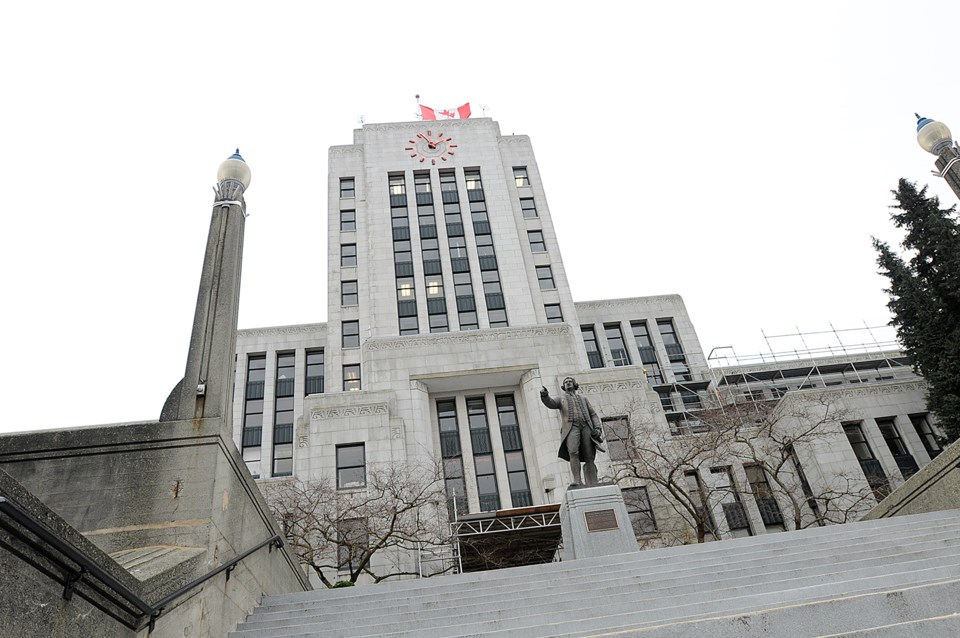This week Mayor Gregor Robertson was much applauded in his address to the B.C. Federation of Labour convention when he committed to support the Fed’s drive to increase the minimum wage in this province by almost 50 per cent to $15 dollars an hour.
He would, he told the conference delegates, raise the issue with Premier Christy Clark the next time the two of them meet.
But all he can do is ask. So don’t hold your breath.
Clark raised the minimum wage when she first took office and that was the first increase in a decade.
But on the wage front there is one area the city has complete control. During the municipal election campaign Robertson committed the city of Vancouver to becoming a “living wage employer.”
He made that promise before an audience of 800 or so folks at the Italian Cultural Centre made up of community leaders, unions and faith-based groups calling itself the Metro Vancouver Alliance.
The notion of a living wage is also a component in Vancouver’s Healthy City strategy passed unanimously by council earlier this year.
(Before we get too far down the road here, I should disclose that Vancity Credit Union, where I am a member of the board of directors, is the biggest private sector living wage employer in the country and has provided resources to the city in its pursuit of this policy.)
The living wage did not come up as a contentious issue during the campaign because when Robertson made that commitment, the NPA’s Kirk LaPointe, COPE’s Meena Wong and the Green Party’s Adriane Carr were also on the stage that day agreeing to support a living wage policy at the city.
In the 1990s, the first living wage campaigns were launched by community initiatives in the U.S. addressing increasing poverty faced by workers and their families.
Unlike the minimum wage, a living wage is calculated to lift people out of a state of poverty. People working at minimum wage jobs often still have to rely on government and charitable subsidies to make ends meet.
The calculation of a living wage depends on costs of goods and services in the jurisdiction where you live.
A living wage is the hourly amount a two-parent family with two kids and both parents working full time needs to cover basic expenses such as food, clothing, shelter and transportation.
In some jurisdictions they include the cost for childcare, education and extended healthcare, as well as basic benefits.
The current living wage rate for Metro Vancouver is $20.10 an hour.
If the city does carry through on this. it will be the biggest such employer in the country. Currently the only municipality which has committed to this policy is New Westminster and they began their program in 2011.
Now, you may well wonder, what will this cost. Well on the city’s main payroll it will probably be very little.
The lowest “pay band” for city and park board workers is $18.33 not including benefits. So very few, if any, workers would fall below the $20.10 per hour.
But here is where the impact really takes place. A living wage employer commits to only dealing with contracted-out service and goods providers whose workers are paid a living wage.
So it gets a bit tricky.
When suppliers bid on contracts with the city they would have to provide some evidence they too are living wage employers.
It could also mean that if they have to raise wages to meet that criterion, their bid will be higher so the city’s costs would possibly increase. At this point nobody knows what that will mean in dollar terms.
It is however increasingly common for organizations in both the public and private sector to use procurement policies to achieve social goals.
They can demand suppliers have a certain percentage of women, First Nations or persons with disabilities on their payroll. They can also demand that the supplier not be involved in the production or distribution of certain goods such as firearms or tobacco.
Or in the case of a living wage policy for the City of Vancouver, they can help ensure that folks working for their many suppliers earn enough to afford to live well above the poverty line.
twitter.com/allengarr



